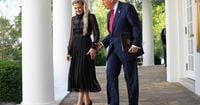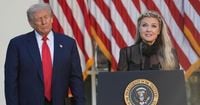On a crisp October morning in Washington, D.C., the White House Rose Garden was transformed into a place of both mourning and celebration as President Donald Trump posthumously awarded the Presidential Medal of Freedom to Charlie Kirk. The event, held on what would have been Kirk’s 32nd birthday, drew a crowd of administration officials, media personalities, and close allies, all gathered to honor the late conservative activist whose life and legacy have left a significant mark on American politics.
Charlie Kirk, founder of the influential youth conservative group Turning Point USA, was assassinated just over a month ago while speaking at Utah Valley University during his “Prove Me Wrong” tour. The shocking act of violence sent ripples through the political landscape, prompting tributes, outrage, and a renewed debate over the boundaries of political discourse and activism in the United States. According to the Associated Press, Kirk’s widow Erika Kirk accepted the nation’s highest civilian honor on his behalf, her voice trembling as she addressed the assembled crowd. "Thank you, Mr. President, for honoring my husband in such a profound and meaningful way. And thank you for making this event a priority," she said, wiping away tears. "Your support of our family and the work that Charlie devoted his life to will be something I cherish forever."
The ceremony was more than a commemoration; it was also a statement. President Trump, just hours after returning from a whirlwind diplomatic trip to Israel and Egypt, made it clear that he would not miss this event for the world. "I raced back halfway around the globe," Trump remarked with characteristic bravado. "I was going to call Erika and say, ‘Erika, could you maybe move it to Friday?’ And I didn’t have the courage to call. But you know why I didn’t call? Because I heard today was Charlie’s birthday."
The Presidential Medal of Freedom, established by President John F. Kennedy in 1963, is meant to recognize individuals who have made exceptional contributions to the security or national interests of the United States, world peace, or other significant public or private endeavors. Trump, in his remarks, called Kirk a "fearless warrior for liberty, beloved leader who galvanized the next generation like nobody I’ve ever seen before, and an American patriot of the deepest conviction, the finest quality and the highest caliber." He did not mince words about the circumstances of Kirk’s death, labeling it a "horrible, heinous, demonic act of murder" and directly blaming "far-left radicals" for violence and terror. "He was assassinated in the prime of his life for boldly speaking the truth, for living his faith and relentless fighting for a better and stronger America," Trump declared, as reported by Nexstar Media.
In a move that underscored the administration’s hardline response, the Trump administration announced on the same day that it had revoked the visas of six foreigners from Argentina, Brazil, Germany, Mexico, Paraguay, and South Africa. These individuals were accused by U.S. officials of making derisive or mocking comments about Kirk’s assassination. The administration’s actions reflect a broader crackdown on what it perceives as left-wing violence and those who support or trivialize it, a stance that has drawn both praise and criticism from across the political spectrum.
Erika Kirk’s speech was a poignant highlight of the ceremony. She shared a personal family tradition: every year on Charlie’s birthday, they would celebrate with mint chocolate chip ice cream. This year, the bittersweet ritual took on a new meaning. Erika recounted how she asked their three-year-old daughter what she might have given her father for his birthday. The child’s answer—a stuffed animal and a cupcake—brought a moment of levity to an otherwise somber occasion. Erika described the medal as "the best birthday gift he could ever have," and reflected on her late husband’s humility and sense of duty: "If the moment had come, he probably would have run for president, but not out of ambition. He would only have done it if that was something he believed that his country needed."
Kirk’s influence on American politics, particularly among young conservatives, was significant. Turning Point USA, the organization he founded in 2012, has grown to encompass hundreds of chapters on college campuses nationwide. Trump credited Kirk as a key reason for his own reelection in 2024, noting his ability to mobilize the under-30 vote. As CBS News reported, Trump remarked, "He would have had a march on the Capitol by people whose average age is about 21, because there’s nobody that had that relationship with young people." Kirk was also instrumental in shaping the 2024 presidential ticket, encouraging Trump to select JD Vance as his running mate and fostering alliances that would define the administration’s direction.
The ceremony was attended by a who’s who of conservative media and political figures, including Donald Trump Jr., Vice President JD Vance, Fox News hosts Sean Hannity, Jesse Watters, and Laura Ingraham, as well as former Fox News host Tucker Carlson. Argentine President Javier Milei, who had been visiting the White House earlier in the day, also stayed to pay his respects. The event’s location—the newly renovated Rose Garden—was chosen to accommodate the large and enthusiastic crowd, with Trump joking about the weather clearing up just in time: "I was telling Erika, God was watching. And he didn’t want that for Charlie."
Kirk’s politics were nothing if not polarizing. He was an outspoken critic of gay and transgender rights, frequently inflamed racial tensions, and was known for making controversial statements, including repeating Trump’s false claims about former Vice President Kamala Harris and making derogatory remarks about George Floyd. His unapologetic style made him a hero to many on the right and a lightning rod for criticism on the left. Trump’s decision to liken Kirk to historical figures such as Socrates, Saint Peter, and Martin Luther King Jr. was met with both admiration and skepticism, illustrating the deep divide in public opinion over Kirk’s legacy.
The aftermath of Kirk’s assassination has been marked by both grief and political maneuvering. Utah prosecutors have charged a suspect with aggravated murder and have signaled plans to seek the death penalty. Trump’s administration has vowed to crack down on what it calls "radical left violence," a promise that resonates strongly with the president’s base but has raised concerns among civil liberties advocates who worry about the potential for overreach and the targeting of political opponents.
Since its inception, the Presidential Medal of Freedom has been awarded to a diverse array of recipients, from athletes and artists to politicians and activists. Trump has made a point of using the honor to recognize figures who align with his values and vision for the country. Previous recipients during his tenure include Tiger Woods, Rush Limbaugh, and Rudy Giuliani, with plans to honor Ben Carson and others in the near future.
As the ceremony concluded, Erika Kirk offered a final reflection that seemed to capture both the pain and the pride of the moment: "To live free is the greatest gift but to die free is the greatest victory." For those gathered in the Rose Garden, and for many watching across the nation, the day was a reminder of the enduring power of conviction—and the costs that sometimes come with it.





